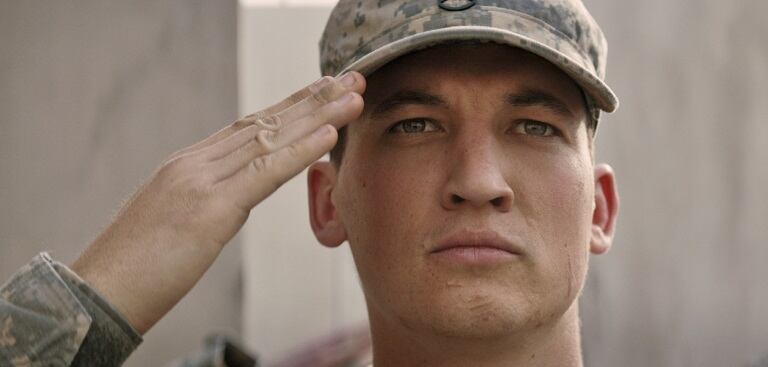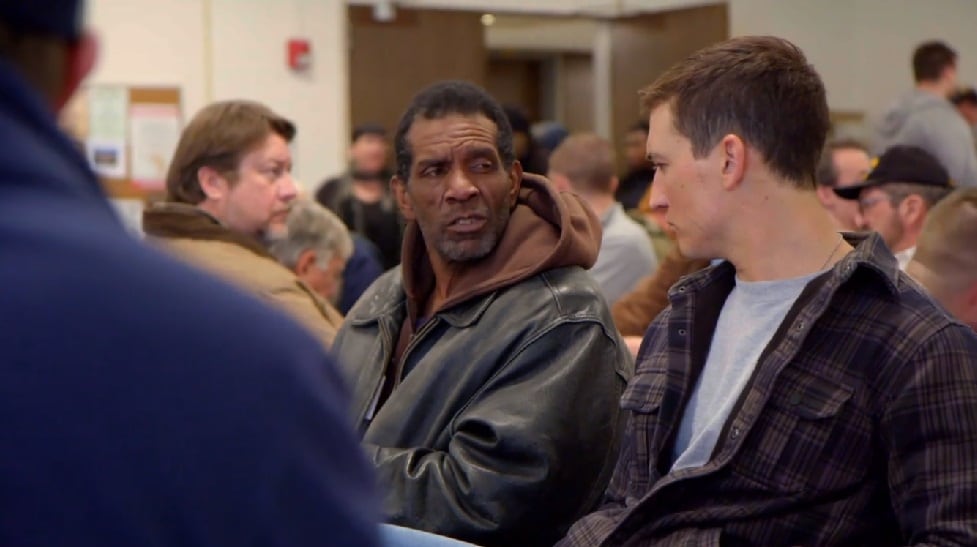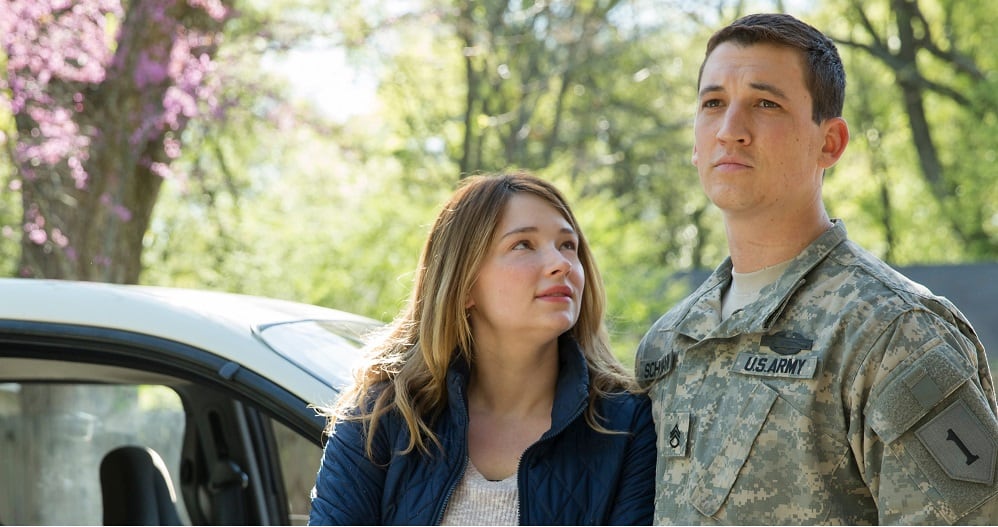The phrase “thank you for your service” has good intentions, but sometimes that’s as far as the conversation goes with a service member who has come back from deployment.
A new movie starring Miles Teller uses the phrase as a tongue-in-cheek title as it explores what happens when troops return from combat.
“ ‘Thank you for your service’ seems to be the beginning and the end” of civilian engagement with military members, said Teller (“War Dogs,” “Whiplash”), the lead actor in the movie based on a nonfiction book of the same name. “It should be more of a conversation.”
The movie — written and directed by Jason Hall, who worked on “American Sniper” — opens Friday. It follows soldiers from 2nd Battalion, 16th Infantry Regiment, 4th Infantry Brigade Combat Team, 1st Infantry Division, who served in Baghdad during the surge in 2007 and 2008.
Journalist David Finkel embedded with the unit as it worked to stabilize part of the city. He wrote “The Good Soldiers” in 2009 about the group’s time on deployment.
After the soldiers returned home, Finkel observed how they reacclimated to stateside life. He published “Thank You for Your Service” in 2013.
Like the book, the movie focuses on Staff Sgt. Adam Schumann (played by Teller) and his battle buddies as they work through what happened on the battlefield, whether they have post-traumatic stress, and if they do, how they deal with it.
Schumann and his friends — Tausolo Aeiti (Beulah Koale), Will Waller (Joe Cole) and Michael Emory (Scott Haze) — navigate their relationships with each other and their families as they come to terms with seeking help.
“The first thing is accepting that you need help,” Schumann told Military Times. “Letting yourself be OK with getting help.”
Post-traumatic stress isn’t a broken bone, he said.
RELATED

RELATED

“You can’t just go get a splint or a cast,” Schumann added, saying he doesn’t think you really know what’s wrong until you start talking about it.
Even health-care providers and psychological professionals can’t do anything if you’re not willing to talk about it, he said.
Schumann, who deployed to Iraq three times, said everyone reacts differently to being in a combat situation, but there’s usually a common thread to the post-traumatic stress side of it.

“My suggestion would be to try everything,” he said. “If someone suggests something, don’t pass it off as, ‘That’s silly.’ ”
The infantryman said he tried yoga, one of the methods that has been found to lessen the symptoms of post-traumatic stress.
“I’m a grunt in the Army, and I’m sitting in a classroom with yoga mats and listening to music and laying on the ground meditating,” he said. “And it was wild, but it helps.”
STARTING A CONVERSATION
Teller said this isn’t a documentary on post-traumatic stress — it’s Schumann’s story.
“Less and less people have a friend who joined the military or even know someone that’s in the military,” Teller told Military Times. “I think that it just reminds people of what’s happening every day.”
Most of the general public is familiar with the suicide statistics — 20 veterans take their own lives every day — but the movie helps put a face to this issue.
“As a country, we do have an obligation to help bring these guys back,” Teller said. “Not just through the VA system.”
Hall, the film’s writer and director, said working on this movie was a different experience from working on “American Sniper.”
“[These soldiers] had a wildly different experience” than Chris Kyle, the Navy SEAL in “American Sniper,” Hall said. “They didn’t come home as heroes with book deals. These guys were coming home to anonymous cities.”
Hall said it was important to remember that the war really cost something for soldiers Schumann, Aeiti, Waller and Emory.
“For Chris, [the war] created something,” he said. “This was a different experience for these guys.”

GETTING IT RIGHT
The cast of the movie went through “intense and rigorous training” to prepare for the movie, Hall said.
During this “Hell Week,” the actors had to give up their phones and keep watch all night — they weren’t allowed more than two hours of sleep.
“They did that not because of me,” Hall said, “but because they knew what they were representing.”
Service members are asked to be very specific in the military, and the cast wanted to portray them in that same specific way.
Schumann said he was impressed with how open to suggestions the cast and filmmakers were. Hall encouraged Schumann to point out any mistakes he noticed during filming.
“I was getting ready to fly out one day, and I just went down to say goodbye to them,” Schumann said. “And I walked up to Miles, and he’s in my Class A [dress uniform], and they were so f--ked-up looking.”
Schumann helped Teller switch the ribbons around and straighten the buttons.
“When someone in the Army sees that, that’s going to pop out more than anything,” Schumann said. “You see that every day. You know the standard, and I was really happy that they were open to that.”
Teller said spending time with Schumann helped prepare him for the role.
“I just hold this occupation and the guys who put on that uniform in very high regard,” he said. “And I felt a very deep obligation to get it right.”
Hall said it’s one thing to get a uniform right because you have something to go off of, but emotional truth is the next level.
Fighting a war in a new age of technology also brought a new way of documenting it.
“This was documented on cellphones in a way no other war before had been,” Hall said.
When Teller would ask Schumann a question, Schumann could open up a photo album on his phone and show Teller certain places and people.
“We’re able to get a very tangible look at what it was like,” Hall said.
‘A LITTLE BEACON OF HOPE’
The cast and crew want the movie to help service members open up about their experiences.
During one of the screenings, writer/director Hall said a Special Forces veteran brought his wife.
“Afterward she said, ‘Hey, do you have any stories like that?’ And he was like, ‘Yeah, actually, I do,’ ” Hall said. “And this guy had been home for three years, and they just never talked about it.”
The veteran never brought it up, and his wife never asked, because it’s uncomfortable, he said.
“There’s something there where it’s like, you’re not sure how to unwrap it,” Hall said. “How to get in there and open this thing up. The movie gave them an opportunity to do that.”
The director hopes the movie gives people a way to understand post-traumatic stress a little bit better.
The movie touches on the culture of how getting help makes you seem weak — a stigma that Adam Schumann, whose story became the basis for the film and who plays a supporting role in the movie — hopes can be addressed.
“My treatment was this long process, and I wish I would’ve read into it more,” he said. “There’s no silver bullet for this. It depends on the individual.”
Not every service member who deploys will come home with post-traumatic stress, but for those who do, Schumann wants the movie to open up a discussion.
“I hope it maybe sparks a spouse to nudge her husband after they see it” and talk about his experiences,” he said. “I hope this is a little beacon of hope.”
Schumann said the movie is also relatable to civilians because he doesn’t think anyone can get through a lifetime without experiencing some sort of traumatic event.
“Whether it’s losing a loved one or a severe accident,” he said. “This sucks, but in the end there’s hope.”
Charlsy is a Reporter and Engagement Manager for Military Times. Email her at cpanzino@militarytimes.com.




